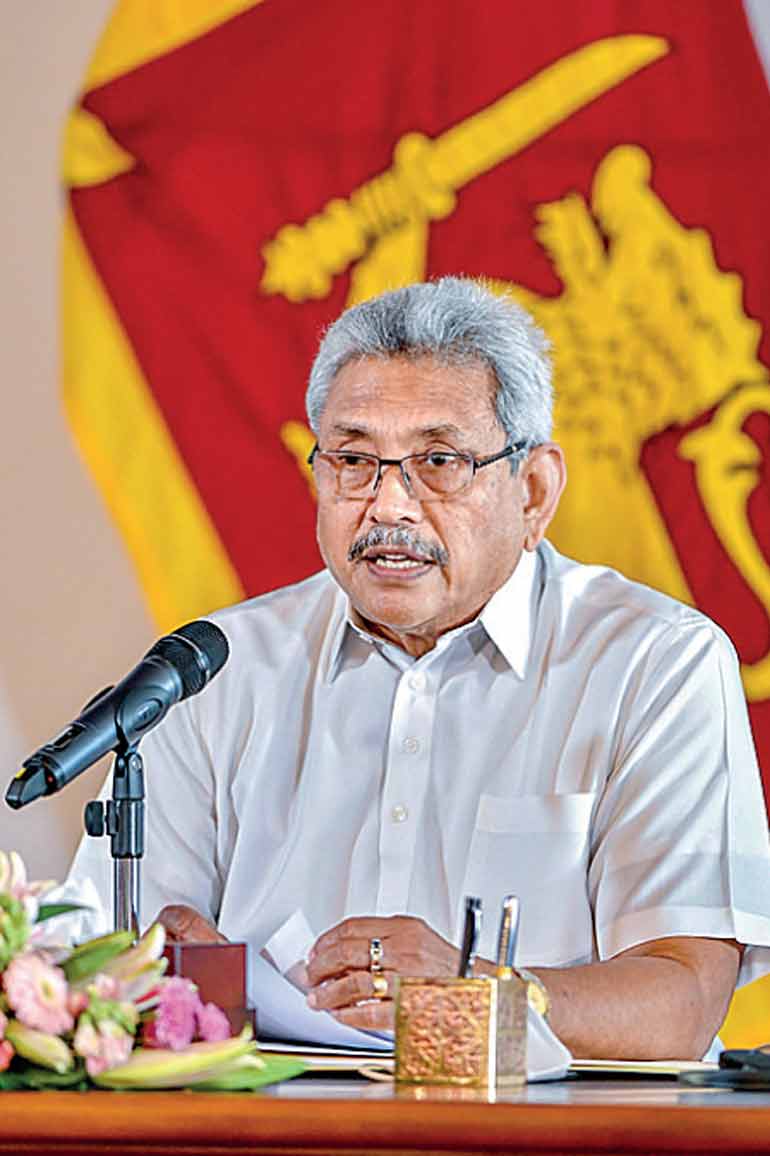Monday Feb 23, 2026
Monday Feb 23, 2026
Thursday, 5 August 2021 00:00 - - {{hitsCtrl.values.hits}}

President
Gotabaya Rajapaksa
The President’s Office yesterday insisted that there was no U-turn in the Government’s policy on promoting organic fertiliser and that the latest gazette only aims to facilitate the importation of “specialised fertilisers”.
“The Government has not granted permission to import chemical fertilisers for local agricultural purposes, neither has it made any changes to the decision taken by the President to use only organic fertilisers for local agriculture. And there will be no changes to this decision in the future either,” a statement from the President’s Media Centre said.
The statement added that Cabinet had granted approval to the proposal made by the Minister of Agriculture on 31 May, to import plant nutrients – which included natural chelated minerals and micro matter. While these natural chelated minerals and micro matter were already being imported under the HS Code, it was prohibited by the gazette notification No. 2226/48. Therefore, in order to grant Cabinet approval to the aforesaid Cabinet paper submitted by the Minister of Agriculture, the gazette notification No. 2226/48 was amended.
“Therefore, in accordance with the Imports and Exports (Control) Regulations No. 11 of 2021 issued by the Minister of Finance on the 30 July 2021, only the following types of specialised fertilisers are allowed to be imported through the Department of Agriculture and other relevant institutions under a special licensing system. Only organic fertilisers, which are up to the International Organic Fertilizer Standards, will be allowed to be used for local agricultural purposes,” the statement from President’s Media said.
It said according to the census conducted by the Department of Agriculture, Department of National Botanic Gardens and other relevant Government institutions, licences have been issued for a period of six months under to institutions registered for protected agriculture in greenhouses and for hydroponics, aeroponics and floriculture, to import nitrogen minerals or chemical fertilisers, and chelated minerals and nutrients.
These licences also permit packets of compound fertilisers containing the three plant nutrients, namely mineral or chemical nitrogen, phosphorus and potassium, or capsules containing a mixture of two of them, or packets weighing 10kg or less containing such products.
“All these fertilisers are allowed to be imported only by the relevant agencies as per the requirements, or under special licenses issued only for limited quantities to suit those requirements. In addition, nitrogen extracts (organic) and mineral potassium can be imported, which are not classified as chemical fertilisers,” the statement said.
Citing the pledge made in the national policy framework ‘Vistas of Prosperity and Splendour,’ the statement noted: “The Government must ensure the right of the people to a non-toxic diet to produce a healthy and productive citizenry. The production of organic fertilisers should be accelerated to use only organic fertiliser for agriculture in Sri Lanka in the next decade.”
Following Finance Minister Basil Rajapaksa’s Gazette, most analysts claimed that the lifting of the ban marks a reversal of the Government’s stand against the use of hazardous inputs in farming and agri industries but the move is likely to be temporary aimed at addressing immediate concerns within the agriculture sector.
Most agri experts and the private sector have recommended a phased-out ban of chemical fertiliser giving enough time for farmers and various agro industries to prepare and prosper via the use of organic material.
According to President Rajapaksa, annually Sri Lanka spent around $ 400 million on fertiliser and pesticides. He has said any loss of yield and income by farmers would be compensated from the savings of foreign exchange otherwise incurred on the import of fertilisers.